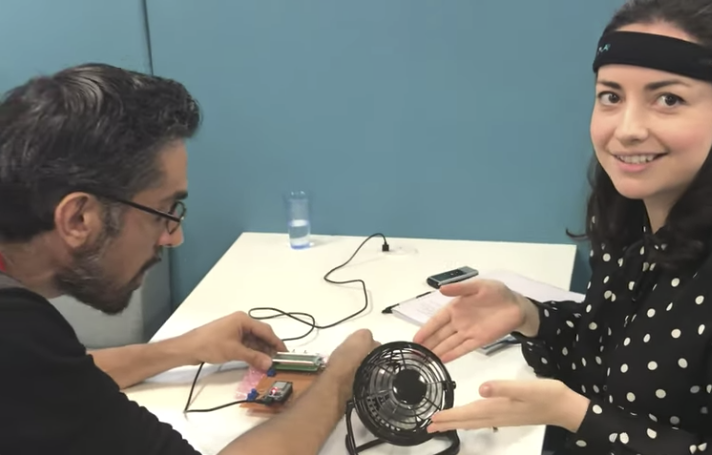
Natasha Bernal, technology reporter for The Telegraph, tests out the headband that lets her control a small fan, assisted by Myndplay founder Tre Azam. (Credit: The Telegraph via YouTube)
Two British Companies Connect Brains to Computers
Elon Musk’s Neuralink brain interface and a Facebook headset prototype that can transfer a person’s thoughts directly into a computer are two American inventions that skeptics thinks are far from final development. So two British companies are taking their shot at developing mind-computer connections.
According to The Telegraph.com, the British inventions are far closer to reality than their American cousins.
Myndplay has developed brainwave-reading technology that aims to create a generation of “Jedi mind warriors,” according to the East London company’s founder Tre Azam. The company worked with advertising giant Ogilvy to find the algorithm to measure pleasure, and has run a project with G4S to help prisoners control their tempers. One of Myndplay’s projects involved a pleasure experiment with Tanqueray gin to measure enjoyment by people tasting its products.

Myndplay tracks pleasure brain waves of participants in a Tanqueray gin event. (credit: Myndplay)
The company’s technology enables people to track how their brains respond to stimuli, using a headband or virtual reality headsets. The technology will also enable people to use mind control to operate devices, instead of touchscreens and voice control. Using a prototype released last week, the company demonstrated how its technology could help people control small objects such as a fan or a light switch using the “power of concentration.”
Another company, which was a spinoff from the University of Oxford, seeks to help treat Parkinson’s and other brain diseases at a much lower cost than traditional therapies. The company, Ni20, would reduce treatment costs from $23,000 (£19,000) to less than $2,000 by implanting tiny chips, smaller than a grain of rice, where patients need electrical jolts for treatment. The neural impulse treatment will help patients control their movements more easily.
“A lot of research communities want a machine to be better than a human or augmenting a human. I saw there was a gap, and a necessity, for restoring human dignity,” said Dr. Newton Howard, a professor in Oxford’s computational neuroscience lab. “Each person we are able to treat is a success. It breaks my heart that we don’t have a solution today.”
Dr. Howard said the technique could stimulate the brain and help develop superintelligence. However, it could also be used to block people’s ability to think and reduce intelligence, leading to concerns about its ethical use. In China, for instance, reports leaked out about workers being hooked up to mindreading technology to monitor their emotions.
“What keeps me awake at night is the thought that this could be developed by Musk and Zuckerberg,” a researcher from a top UK university told The Telegraph. “Their motives are weird, they know little about the topics that they jump into.”







Leave A Comment